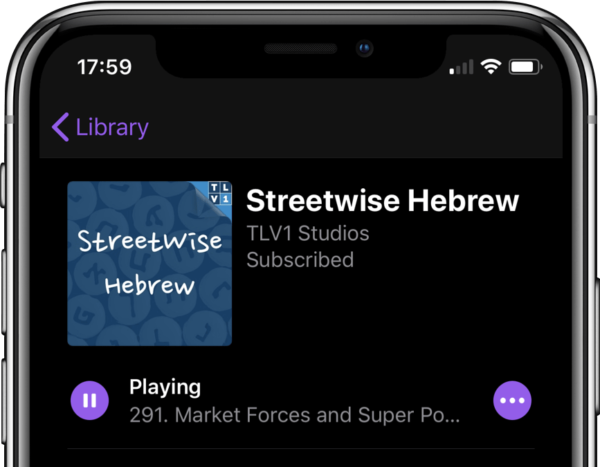How do we say, “I don’t want to offend you” in Hebrew? How about “bullseye”? Or perhaps “fragile”?
On this episode, Guy covers the verb לפגוע (lifgo’a), meaning to hurt, and its usage in everyday Hebrew.
New Words and Expressions:
“Pachot ve-adayin, adayin poge’a” – It’s hurting less, but it’s still hurting – פחות ועדיין, עדיין פוגע
Pagata be-emun ha-tsibur – You hurt, you undermined, the public’s trust – פגעת באמון הציבור
Pagata be-khol ma she-efshar – You hurt, you hit every possible thing – פגעת בכל מה שאפשר
Lifgoa be-mishehu – To hurt someone – לפגוע במישהו
Pagata bi – You hurt me – פגעת בי
Ani lo rotse lifgoa becha/bach – I don’t want to hurt you – אנ’לא רוצה לפגוע בך
An’lo rotse/rotsa lifgo’a o mashu – I don’t want to offend or something – אנ’לא רוצה לפגוע או משהו
Slicha im pagati – Sorry if I hurt you – סליחה אם פגעתי
Te’unot paga u-varach – Hit and run accidents – תאונות פגע וברח
Te’unat paga u-varach – Hit and run accident – תאונת פגע וברח
Pgi’ah – Harm, injury – פגיעה
Pgi’ah ba-gav – Back injury – פגיעה בגב
Pgi’ah yeshira – Direct hit – פגיעה ישירה
Pagu’a – Hurt – פגוע
“Pagu’a ve-koev” – “Hurt and hurting” – פגוע וכואב
Pgu’a nefesh, mitmoded nefesh – A person with mental disabilities – פגוע נפש, מתמודד נפש
Pagi’a, pgi’ah – Vulnerbable – פגיע, פגיעה
Shavir – Fragile – שביר
Zamin – Available – זמין
Hu lo mesugal lifgo’a be-zvuv – He couldn’t hurt a fly – הוא לא מסוגל לפגוע בזבוב
Paga bul – Hit the target directly, spot on, bingo – פגע בול
Pega ra – Pest – פגע רע
Playlist and Clips:
Yehuda Poliker – Pachot Aval Ko’ev (lyrics)
Avi Biter – Pagu’a Ve-ko’ev (lyrics)
Dudu Tassa – Ani Rats (lyrics)
Want to see more Hebrew gems? Like Streetwise Hebrew on Facebook and Instagram.
Want Guy to talk about a pressing Hebrew issue? Find him at StreetwiseHebrew.com or follow him on Twitter.





I would like to check out the all Hebrew podcast prior to deciding whether or not to become a patron.
If I understood you correctly, you are allowing us to “sample the goods” by doing to episode 181.
I would like to do that but don’t know how to find it. Could you give me simple instructions as to how/where to
sign in and find access to the sample.
Todah Rabah!
v’kol tuv!
Here it is
Hi there,
I recently found your web page by chance and was immediately – nicely – surprized.
I like the way you approach things and I will surely be back.
However, today I have a question about one of the topics on this particular show. You told us, the audience, about how the religious guys say סליחה אם פגעתי to each other לפני יום כיפור.
1 – note – many people do that, not only the religious people
2 – Question: what about the everyday life – can one say סליחה אם פגעתי when he means what it means, or has it become something one only says before Yom Kippur? And if so, then how do you say it – when you talk to someone and want to truly express “I am sorry if I offended you…..I didn`t mean it” ?
Looking forward to your reply.
Until then שלום וכל טוב
Hi Aurelian
Thanks for this.
Yes, you’re right, some non religious people might say it as well before Yom Kippur.
And yes, you can use it anytime you think you might have said something in the wrong place.
Guy